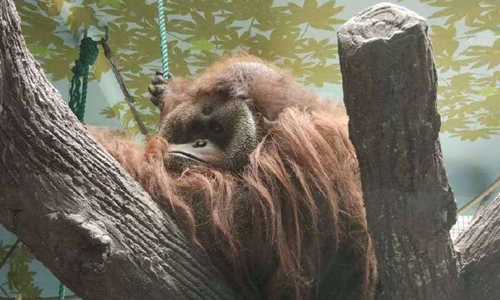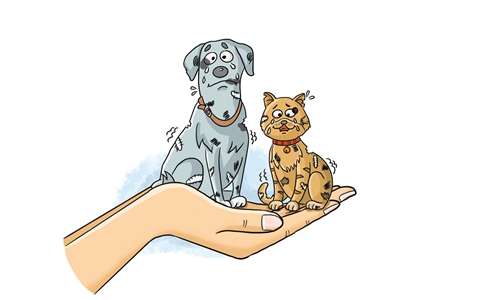ARTS / CULTURE & LEISURE
Chinese netizens urge zoos to blacklist visitors who feed animals after story of gorilla with “Three Highs” goes viral

Sentai in the zoo. Photo: Sina Weibo
The rather unsettling stories of an old gorilla who suffers from illness and the death of a deer who had 3.5 kilograms of plastic bags in her stomach were recently highlighted at a charity event held by the Shanghai Zoo to promote one of the most basic zoo rules: Do not feed the animals.By highlighting the recent condition of Sentai, a gorilla who tortures by the "Three Highs" of- high blood pressure, high lipid count and high blood sugar - due to visitors' tendency to give him food, the zoo has shed light on how feeding zoo animals can damage their health. It also noted that animals in the primate and bird sections are among those hardest hit by this behavior.
"These two areas are open and have fewer barriers than other areas of the zoo. And primates' behavior of begging for food also increases the possibility that visitors would feed them," a representative of the Shanghai Zoo told the Global Times on Wednesday.
The most common foods that visitors throw to animals in these sections include sunflower seeds, peanuts, crisps and bread. While visitors may have good intentions to give these animals a "treat," but such high-calorie and high-carb foods can interfere with the nutritionally balanced meal plan developed by zoo keepers, such as Sentai's meal box of assorted fruits, leaves, juice, vegetables and buns made from eggs and wheat, and can cause them to become sick.
"It can cause symptoms such as bloating or diarrhea, and can impact their cardiovascular systems and molting in birds. Imagine if your children were always given puffed snacks and sweets, would that not ruin their appetite for healthy food? This behavior can lead animals to ignore the food that is actually good for them," Zhang, an animal expert in Beijing, told the Global Times on Wednesday.
Poor Sentai's situation triggered netizens' anger and ignited discussion about the topic on China's Twitter-like Sina Weibo.
Many netizens urged zoos across the country to do more than just give verbal warnings when visitors feed animals, while others suggested that zoos establish a "blacklist" to keep rule breakers out.
"It's not only just us visitors, zoos should add feeders to a banned list, and also enhance monitoring systems to spot people who feed animals. Also, to stop some clever animals asking for food from visitors," Xie, a 26-year-old animal welfare activist in Beijing, told the Global Times on Wednesday.
"We do not think we will introduce a 'blacklist' yet as that is a more complicated job more than we can handle as it includes identity checks. What we do now is to correct people who make mistakes and work on increasing public awareness to stop this behavior," said the Shanghai Zoo representative.
Some netizens said that after hearing the news that they felt guilty for previously feeding animals at the zoo, while others said they were surprised to find that something meant with good intentions could actually harm the animals.
"We human beings can be expressive and take action immediately when we feel ill or uncomfortable, but animals' signs can be subtle and often take experienced keepers to notice their abnormal behavior. Letting them suffer is already bad, but things can become even worse if a delayed rescue leads to a fatality," said Zhang.



